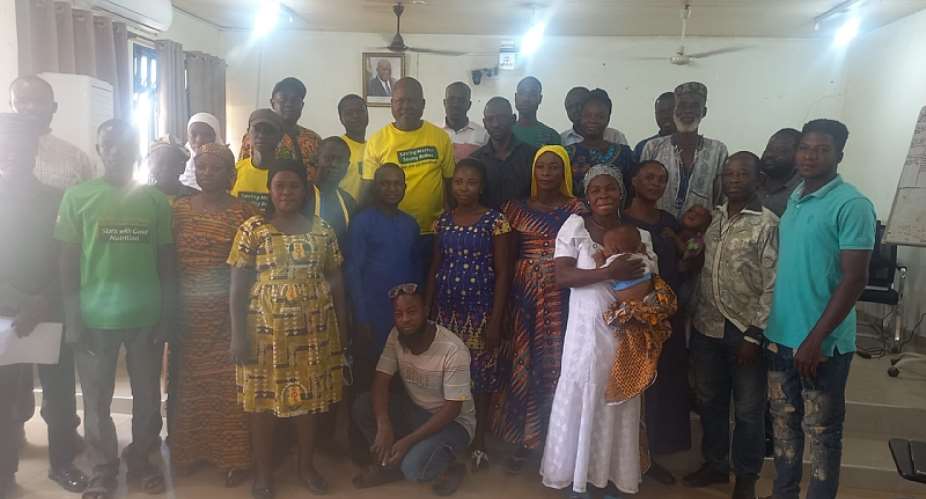Three communities in the Garu District of the Upper East Region have appealed to the District Assembly and non-governmental organisations (NGOs) to help expand their health centres to promote quality healthcare delivery.
They also appealed for the construction of staff accommodation for the health workers to ensure they stayed in the communities and rendered quality services to clients and residents.
Members of the Community Health Management Committees of Denugu, Pialugu and Songo communities made the appeal at Garu, at a community-duty bearer forum organised by WaterAid Ghana, a water, sanitation and hygiene (WASH) focused organisation, as part of the Enhancing WASH (En-WASH) project rolled out in collaboration with Global communities.
The forum was aimed at creating a platform for the communities to engage with the duty bearers including the District Assembly, to identify challenges facing their communities, especially in accessing WASH and urged the Assemblies to prioritise them.
Mr Issifu Abdul-Aziz, Chairman of the Denugu Community Health Management Committee, said the Denugu community had a population of about 5,000 people and the Denugu Health Centre served as a referral facility for five Community-based Health Planning Services (CHPS).
Despite this, he noted, the facility had limited wards to contain the substantial numbers who patronized it.
“The health centre has only 10 beds and so, the health workers are usually compelled to discharge some patients to go home due to overcrowding, and this does not promote quality healthcare.
“Also, the facility does not have accommodation for the nurses and midwives and they have to rent outside, making it difficult for them to respond to cases, especially pregnant women and so we are appealing for help,” he said.
On the part of the Pialugu Health Centre, Mr Simon Akparibo, the Secretary of the Pialugu Community Health Management Committee, revealed that apart from the facility needing expansion, it had no light, thus impeding health service delivery.
He said through the contribution of the community members and the support of a philanthropist, a solar panel was procured for the facility about two years ago, however, the battery to the solar panel was damaged six months ago.
“The whole community is not benefiting from the rural electrification project, but our priority now is the health centre because they need light to work,” he appealed.
On the Songo Health Centre, Mr Manas Awudu, the Secretary of the Songo Community Health Management Committee, noted that the health centre was usually overcrowded due to limited space.
Apart from that, he said, the borehole meant for the health facility had not been mechanised compelling clients to move out of the facility to fetch water, which was creating inconvenience in accessing health services.
Mr Alhassan Fuseini, the Assistant Director, of Garu District Assembly, commended WaterAid Ghana for facilitating the dialogue session and assured the communities that some of their concerns would be prioritised in the next planning and budgeting phase but appealed to communities to initiate self-help projects to attract support from organisations.
Ms Molly Dasoberi Maalinuo, the Project Assistant at WaterAid Ghana, noted that the En-WASH project aimed to facilitate access to and use of sustainable water, sanitation, and hygiene services and products in target districts by employing a systems-strengthening approach.
The beneficiary districts are Binduri, Bawku West, Garu, and Tempane.
“One of the objectives is to increase the use of sustainable, equitable, quality, district-wide WASH services in communities and health care facilities and adopt sustainable district-wide WASH practices in households, communities, and Health Care Facilities,” she said.
She explained that through the project, community advocacy teams had been formed and their capacities built to liaise with community members to identify WASH-related challenges and demand enhanced infrastructure and services from the Assemblies.
GNA





 EOCO returns fire at OSP over Cecilia Abena Dapaah’s money laundering case
EOCO returns fire at OSP over Cecilia Abena Dapaah’s money laundering case
 We’ve not introduced 1% cybersecurity levy on banking transactions – BoG
We’ve not introduced 1% cybersecurity levy on banking transactions – BoG
 ‘Mahama not pleased with my work because I defeated him twice’ — Akufo-Addo
‘Mahama not pleased with my work because I defeated him twice’ — Akufo-Addo
 ‘I’ll control government spending when elected President’ — Bawumia
‘I’ll control government spending when elected President’ — Bawumia
 Bawumia is compassionate, unique politician without corruption tag — Miracles Ab...
Bawumia is compassionate, unique politician without corruption tag — Miracles Ab...
 2024 elections: Elect a new leader if Bawumia fails in his first term — Miracles...
2024 elections: Elect a new leader if Bawumia fails in his first term — Miracles...
 2024 elections: Let Aduomi be if he won't return; just work hard — Prof. Osafo t...
2024 elections: Let Aduomi be if he won't return; just work hard — Prof. Osafo t...
 Multinational companies exiting Ghana worrying; it'll lead to job losses, deter ...
Multinational companies exiting Ghana worrying; it'll lead to job losses, deter ...
 Election 2024: Mahama will destroy my legacy if he wins, so, go out, register an...
Election 2024: Mahama will destroy my legacy if he wins, so, go out, register an...
 UE/R: Your 2-year 'bitterness' towards our members 'shameful' - Three teacher un...
UE/R: Your 2-year 'bitterness' towards our members 'shameful' - Three teacher un...
